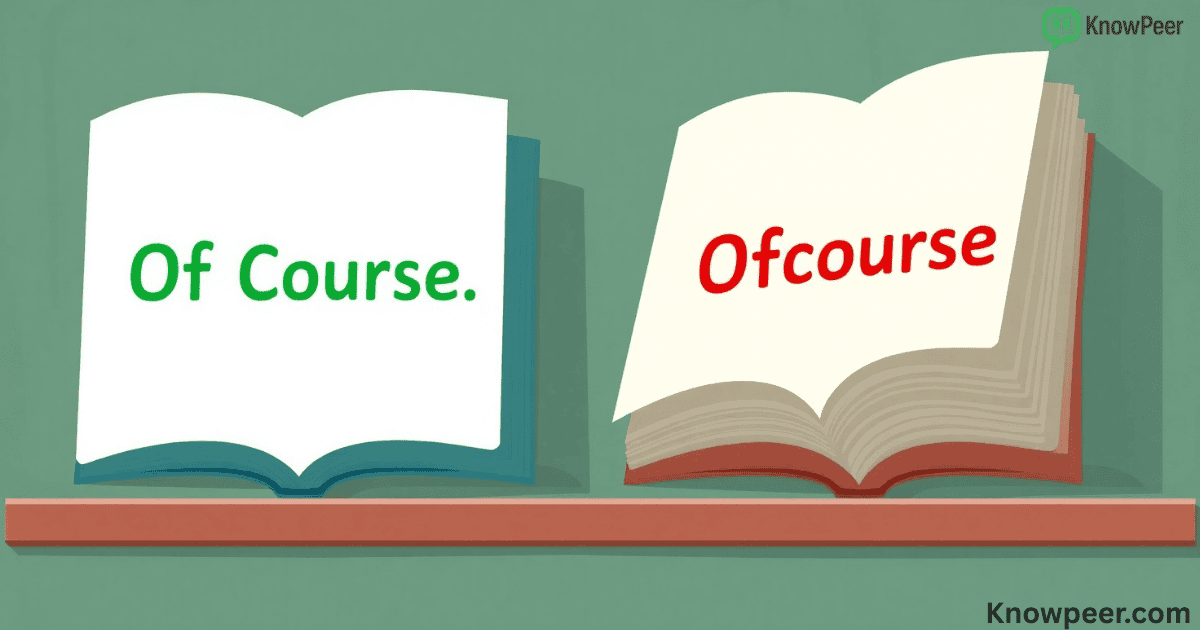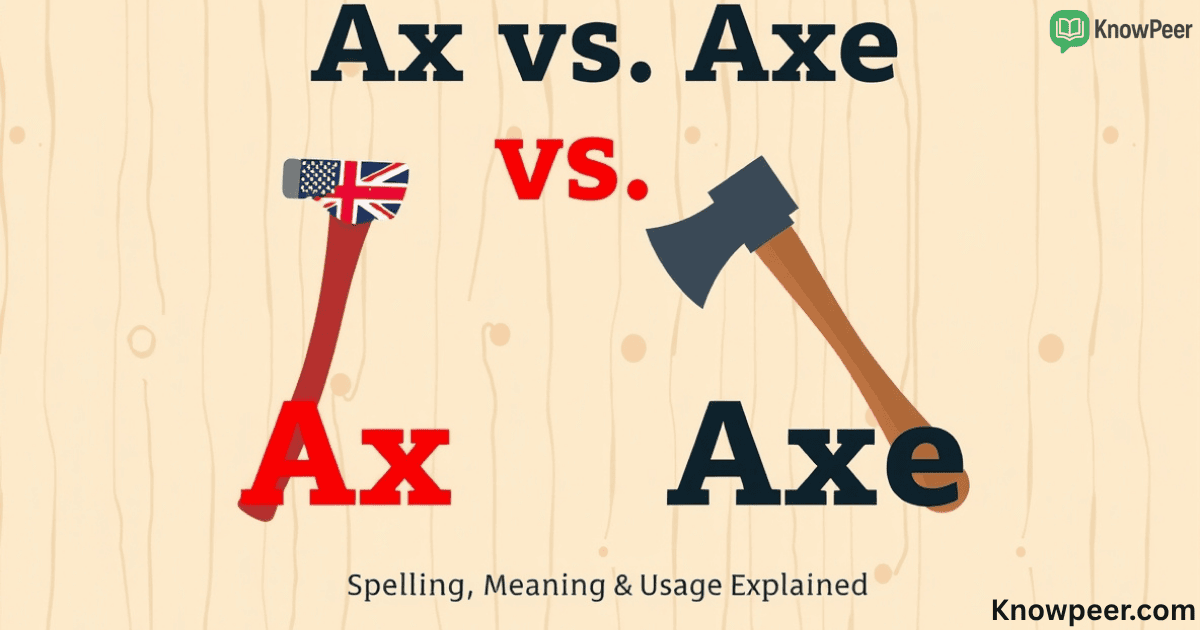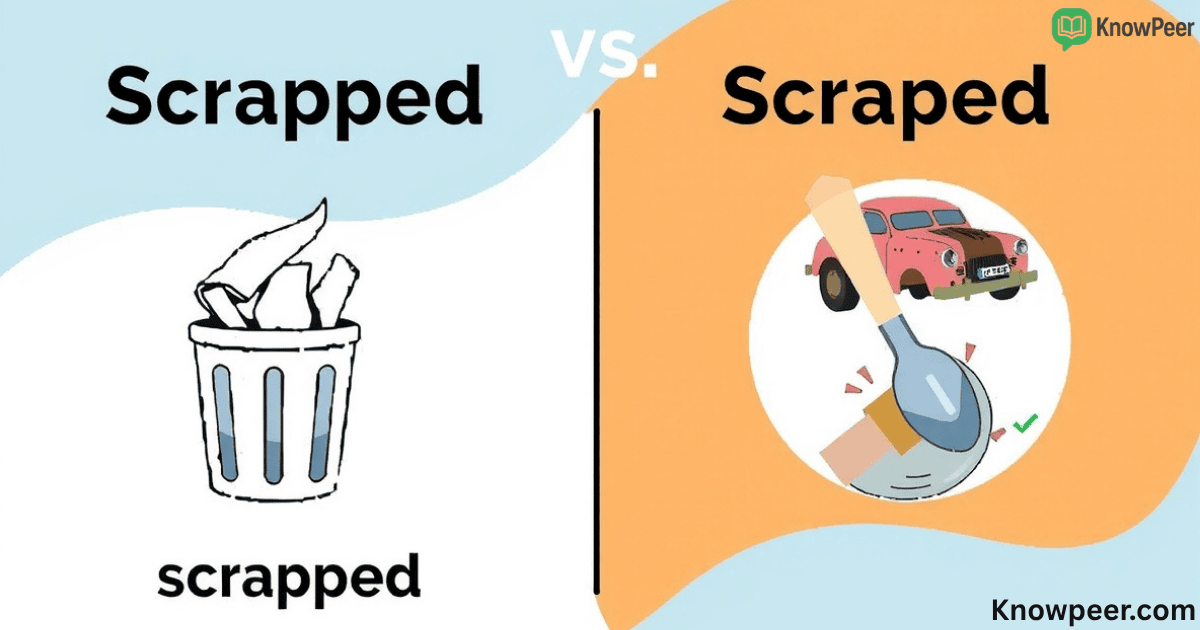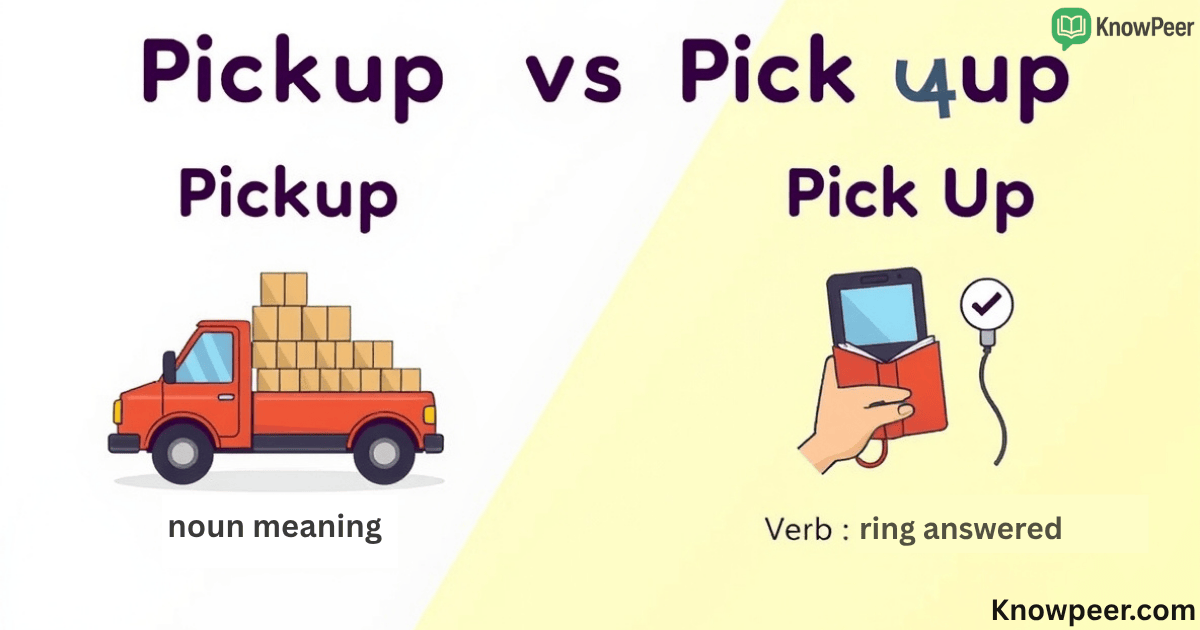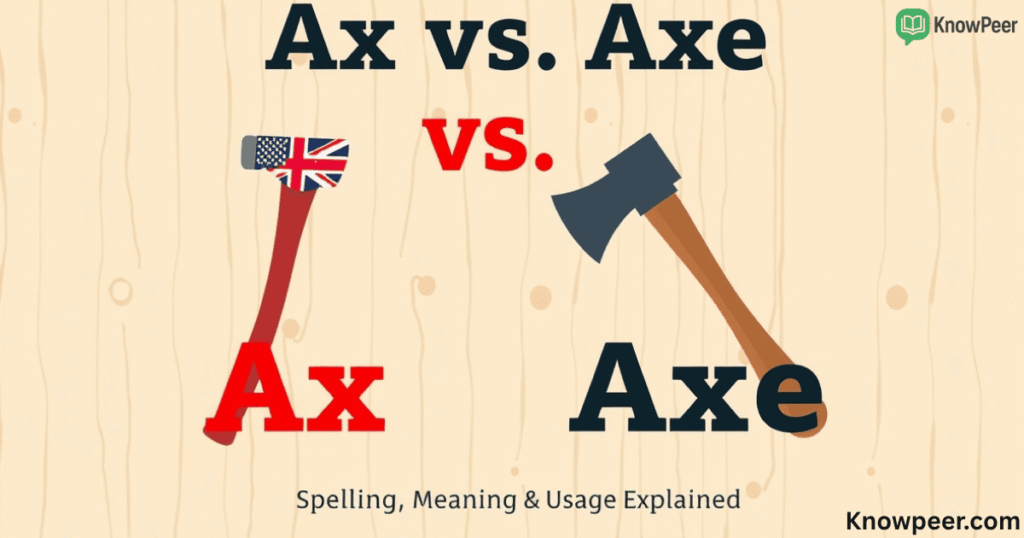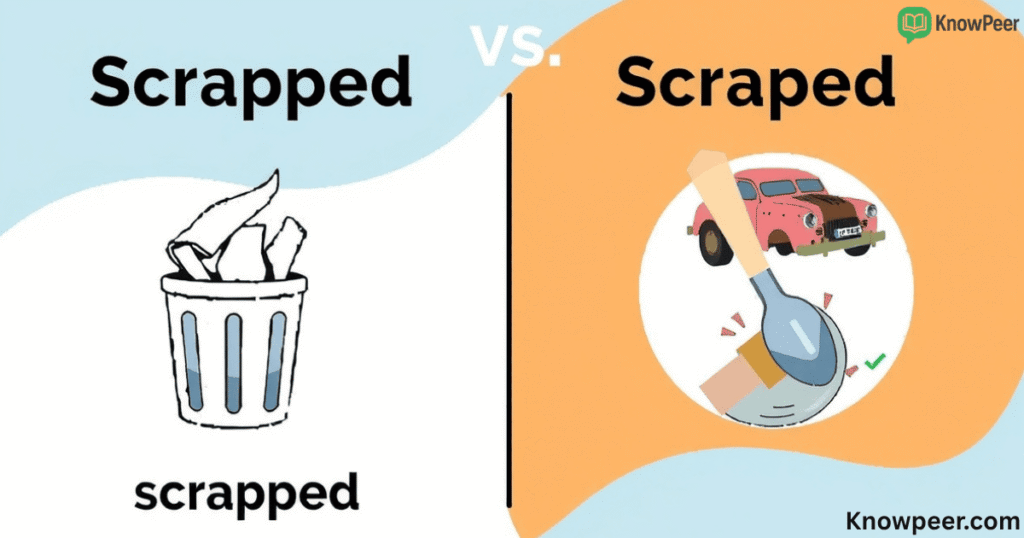Introduction
Many people wonder whether they should write of course or ofcourse, and the confusion is everywhere. If you type fast or rely on auto-correct, you might end up with the wrong version without even noticing. Still, understanding the difference matters a lot because the correct phrase shows clarity, professionalism, and respect for proper English grammar Of Course vs Ofcourse. A small mistake like this may not look serious, but it can change how your writing is judged, especially in formal or academic settings.
The truth is simple: one version is correct and widely accepted, while the other is just a common spelling error. Knowing the of course correct spelling helps you avoid mistakes in essays, work emails, or even casual conversations online. By the end of this article, you will understand the of course meaning, why ofcourse is incorrect, how to use the phrase properly, and what other words you can use instead.
Why the Confusion Exists
The confusion between of course vs ofcourse mostly comes from the way people write in modern communication. Texting and fast messaging often encourage shortcuts, which is why many words become squashed together. Just as some mistakenly write “alot” instead of “a lot,” the same thing happens with “of course.” Over time, this common typo made people question whether “ofcourse” is a valid word.
Another reason for the mix-up is auto-correct features on devices. Phones and computers sometimes save misspelled words, leading users to repeat them without realizing. Language also evolves online, where errors spread quickly because people copy what they see. The result is confusion over simple expressions like of course phrase meaning, which should be easy but has become a frequent grammar mistake in English phrases.
The Correct Phrase: “Of Course”
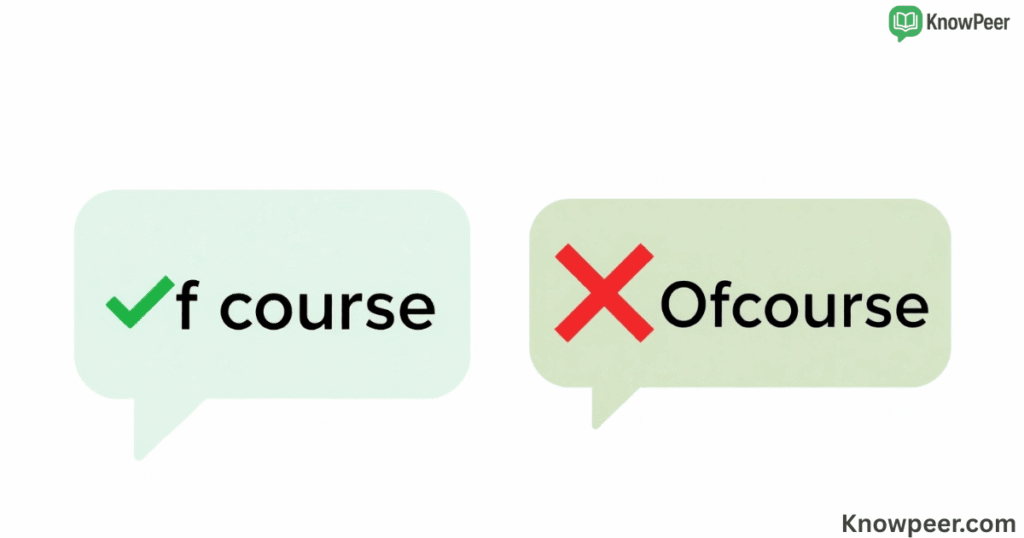
The correct phrase of course is made up of two words. The first word “of” is a preposition, while “course” is a noun. Together, they create a phrase that signals agreement, certainty, or something that goes without saying. When someone says “of course,” it usually means “yes,” “certainly,” or “without a doubt.” This is why of course synonyms include words like “surely,” “naturally,” and “absolutely.”
For example, if someone asks, “Can you help me with this project?” a polite reply would be “Of course.” This phrase sounds natural and friendly in both informal speech and formal writing. Whether you are chatting with friends or writing to your boss, the phrase works well because it communicates support, agreement, and confidence. That makes it a powerful tool in English conversation.
The Incorrect Form: “Ofcourse”
Now let us be clear: is ofcourse a word? No, it is not. Dictionaries, grammar guides, and trusted writing resources do not list “ofcourse” as a valid English word. Writing it as one word is always incorrect. The only reason people think it might be correct is because they see it so often online. But frequent use does not make it acceptable in English grammar.
Using “ofcourse” in professional or academic settings damages your credibility. Imagine sending an email to your manager with the line “Ofcourse, I will handle this task.” Even if the meaning is understood, the error shows carelessness. In fields where precision matters, such as business, law, or education, such a mistake can leave a negative impression. That is why writers and speakers must remember that ofcourse is incorrect and avoid it.
Common Variations and Mistakes
There is more to this than just of course vs ofcourse. Another frequent issue is the confusion with off course and offcourse. These may look similar, but they mean very different things. To understand better, look at the comparison below.
| Phrase | Correct/Incorrect | Meaning | Example Sentence |
| Of Course | Correct | Shows agreement, certainty, or something obvious | “Of course, you can borrow my book.” |
| Ofcourse | Incorrect | Not an English word, common spelling mistake | Not valid in English grammar |
| Off Course | Correct | Refers to something being away from its planned path | “The ship went off course during the storm.” |
| Offcourse | Incorrect | Not a valid English word, simple typo or error | Not valid in English grammar |
This table shows the difference between of course and off course, making the confusion easier to understand. Remember that off course meaning is about direction or navigation, while of course usage is about agreement or confirmation.
Synonyms and Alternatives to “Of Course”
The English language offers plenty of, of course alternative words, which can help you avoid repetition in your writing. Some synonyms include certainly, surely, naturally, absolutely, by all means, without a doubt, and indeed. While these words share similar meanings, each carries a slightly different tone.
For instance, of course vs absolutely is an interesting comparison. “Absolutely” sounds stronger and more forceful, while “of course” feels more polite and natural. Similarly, of course vs naturally shows a softer tone, suitable for casual situations. In professional emails, you might want to use polite alternatives of course such as “certainly” or “by all means,” because they sound more formal. Choosing the right word depends on context, tone, and audience.
Origins and Historical Use of “Of Course”
The history and origin of the phrase goes back centuries. The term originally came from the idea of something following the natural course of events. If something happens “of course,” it means it follows naturally and is expected. This is the historical meaning of course, which later developed into a common idiom used in everyday language.
Writers in the eighteenth and nineteenth centuries often used the phrase to emphasize certainty. Over time, the phrase became deeply rooted in English idioms of course, shifting slightly to express politeness or willingness. Today, when you say “of course,” you are echoing centuries of linguistic tradition. This background helps explain why the phrase feels so natural and essential in English communication Of Course vs Ofcourse.
Examples of “Of Course” in Everyday Sentences

The best way to understand the phrase is to see, of cours , examples in different settings. In informal speech, you might say, “Of course, I will join you for dinner,” showing friendliness. In professional writing, an example would be, “Of course, I will submit the report by tomorrow,” which shows responsibility and agreement.
Here are a few examples of of course in everyday sentences:
- Formal writing: “Of course, the results will be shared with the committee.”
- Informal speech: “Of course, I love ice cream.”
- Professional email: “Of course, I can help you with this project.”
- Wrong usage: “Ofcourse, I will call you later.” (Incorrect spelling).
These cases show how to use of course in a sentence correctly and why spelling matters. Practice in real situations ensures you never make the common mistake again.
Practical Tips for Using “Of Course” Correctly
Avoiding the common English mistakes of course vs off course is easier when you build small habits. One simple tip is to slow down while typing and pay attention to spelling. Proofreading your work before sending or publishing also prevents errors. Another method is to use grammar tools like Grammarly or dictionary checks to catch mistakes like writing “ofcourse.”
If you want to sound professional, especially in business communication, choose professional alternatives of course in email when needed. For example, instead of writing “Of course, I will do this,” you can say “Certainly, I will handle this task.” Developing these habits helps you stay clear, accurate, and polished in both casual and professional communication.
Conclusion
The battle between of course vs ofcourse ends with a clear winner. The correct phrase of course is always two words, while “ofcourse” is a mistake that should be avoided. Confusion comes from fast writing, online shortcuts, and auto-correct errors, but the truth remains simple. Understanding of course grammar and its proper use is essential if you want to write and speak English with confidence.
By knowing the difference between of course and off course, exploring of course synonyms, and practicing with real examples, you can avoid common pitfalls. Whether in casual conversation, academic essays, or professional emails, the phrase “of course” works as a natural and polite expression. Paying attention to small details like spelling may seem minor, but in reality, it builds credibility and clarity in every situation.

